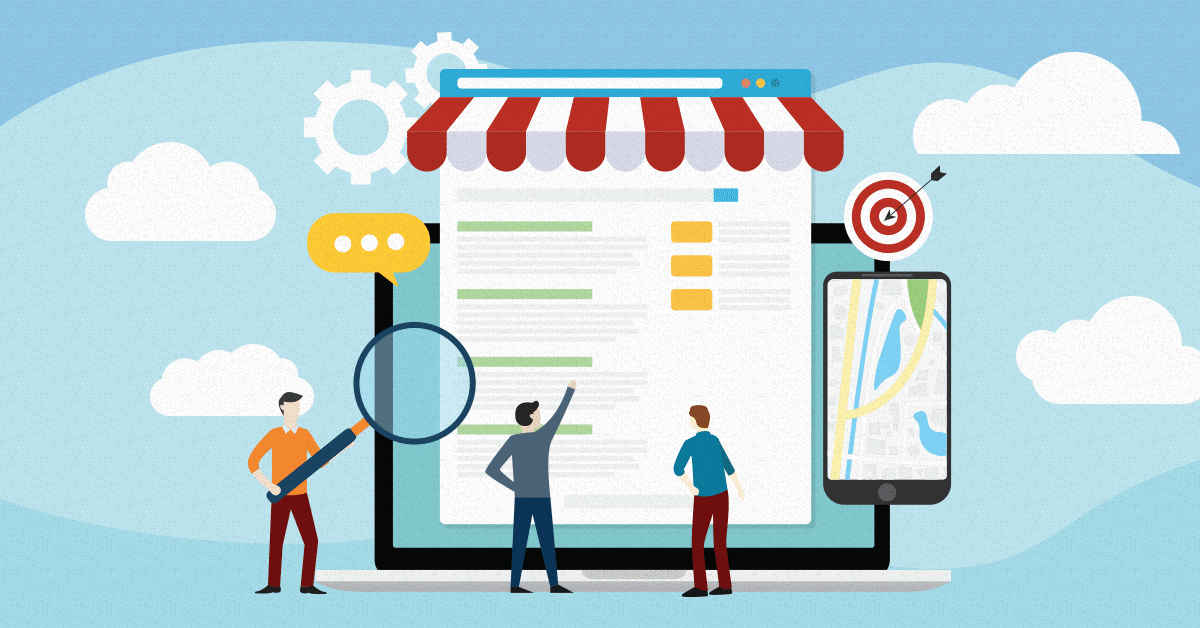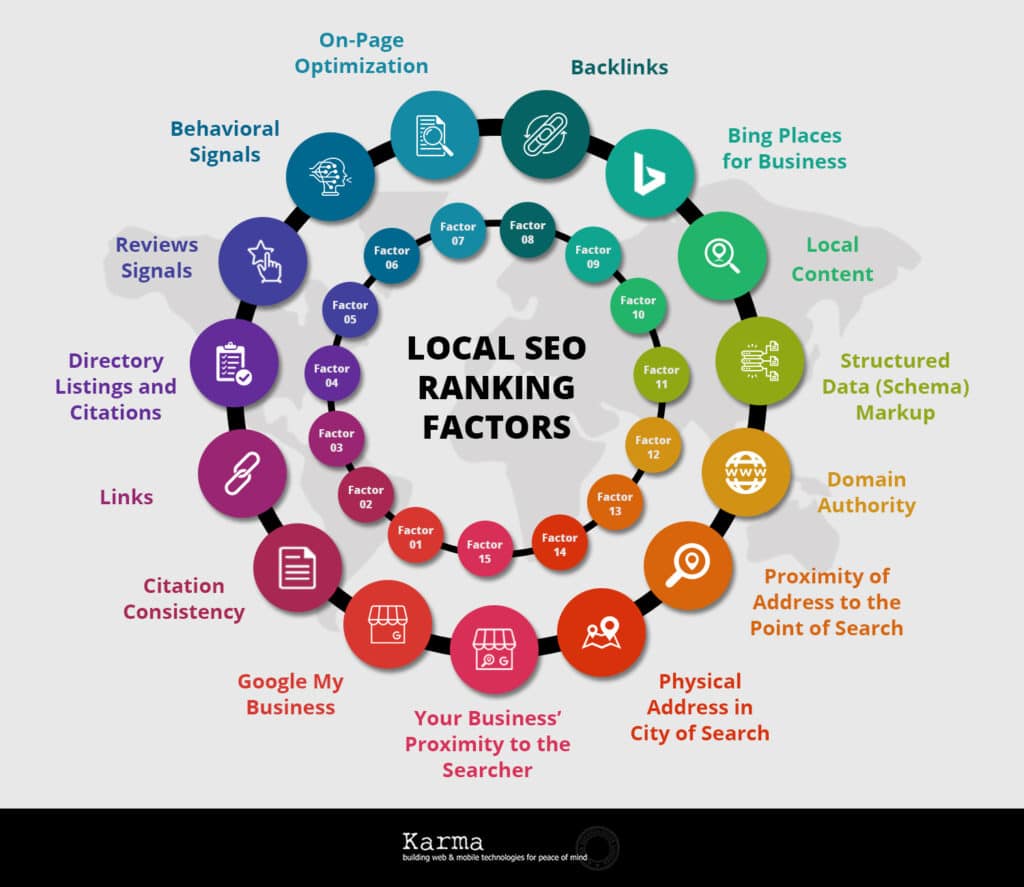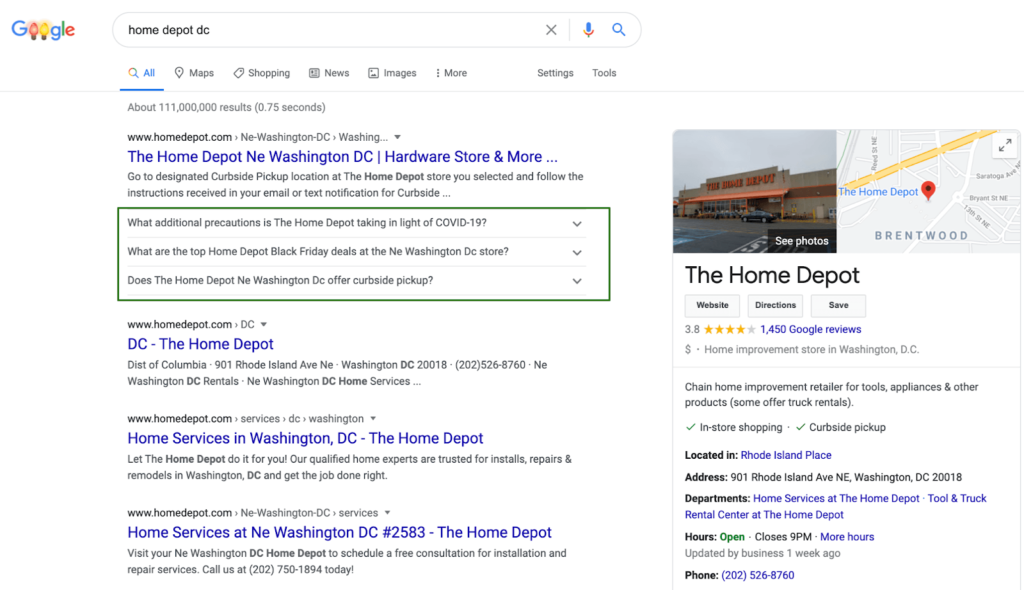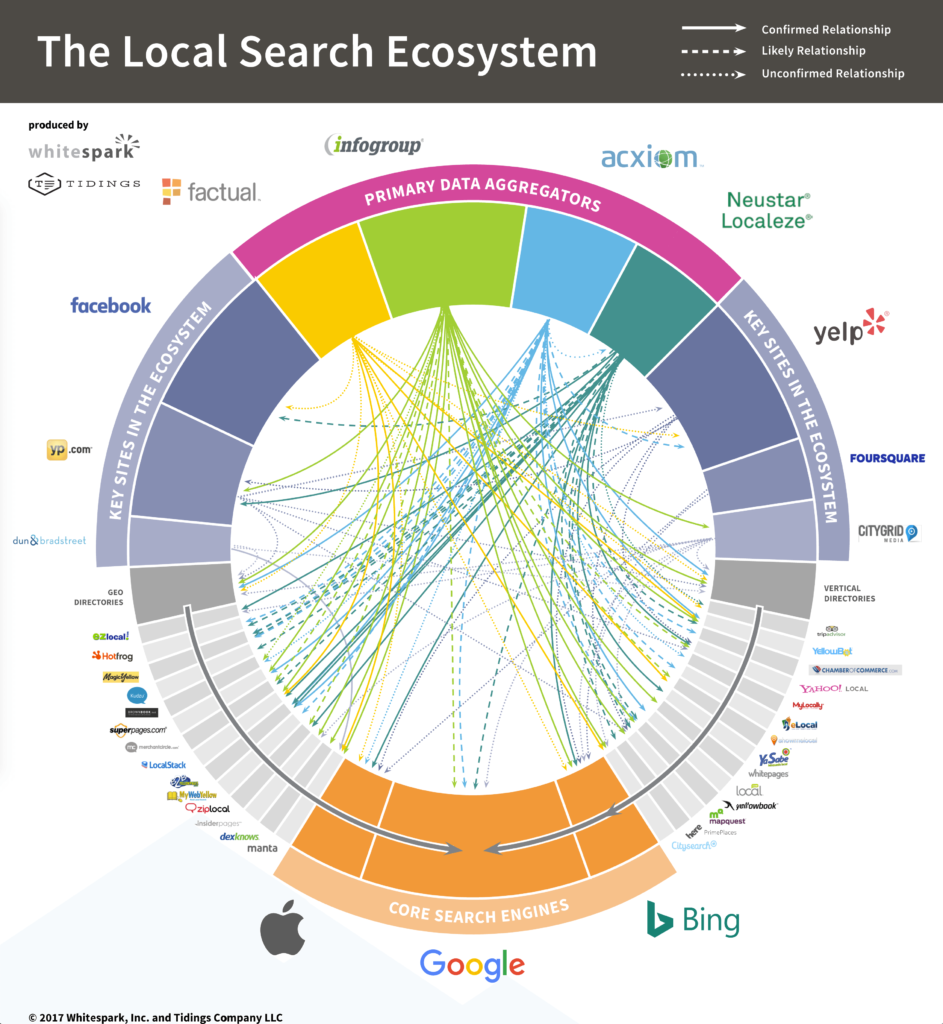If you’re asking yourself, “how do you rank in Google Maps,” then you’ve come to the right place.
We have a comprehensive guide of local SEO ranking factors, tools, considerations, tips, and guidance on how to do local SEO with checklists for different industries. If you’re interested in a specific section, you can use the links below to jump to specific blog sections.
- Local SEO & Google My Business
- Location Pages SEO Best Practices
- Local SEO Checklists
- Local SEO Tools & Services
- Ready to do Local SEO Properly & Drive More Business?
You’ll notice that I didn’t mention any local SEO tricks because we’re not in the business of trying to ‘trick’ Google, and that shouldn’t be your goal either.
Why wouldn’t you want to trick Google to improve local rankings?
- One in three Google employees has a Ph.D. Even if you can “trick” Google into ranking your local business better than it should be, you’re not going to out-think or trick thousand’s of Ph.D.’s. If you can fool all those smart people, then you’re probably in the wrong business and should use your knowledge and skills for more valuable endeavors.
- You may trick Google into ranking your local service business for a while, but once it stops working, you run the risk of being removed entirely from Google Maps listings. Not a situation you want to find yourself in.
So, if you’re looking for ways to “trick” Google into ranking your business in the 3-pack of Google Maps results, this post is not going to be your cup of tea. However, if you’re looking for local SEO guidance to improve your rankings and driving relevant local traffic to your business, we’ve got everything you need to dominate local SEO.
Local SEO & Google My Business
When local SEO service companies refer to Google My Business rankings, they are actually referring to local SEO rankings. This is an essential distinction because Bing also has local map results for businesses and shouldn’t be ignored.
The local SEO ranking factors for Bing and Google are pretty much the same with some differences in how they weigh each factor, but for this post, we’re going to refer to Google mostly but keep in mind that Bing is essential as well.
Local SEO & Google Maps Ranking Factors
Local SEO has its own set of ranking factors. Some of these ranking factors you have control over, and others are out of your control, but for a good reason.
- The actual location of the user searching
- The actual location of your business
- NAP (name, address, and phone number) consistency
- Website landing page relevance and UX, which is why it is also referred to as NAPW (name, address, phone number, and website)
- Presence of a Google My Business listing
- Presence of relevant keywords in your Google My Business listing
- Categories and Services selected
- The overall sentiment, quantity, and average rating of Google reviews
- Presence of relevant keywords in your reviews
- Number of “check-ins” at the location
- Social metrics
Karma created a good infographic of how these local SEO ranking factors are weighted.
How to Rank in Google Maps
Google’s goal is to provide relevant and accurate information to users. With that in mind, one of the best things you can do is give as much information as possible to Google via your Google My Business listings and keep that information up-to-date.
By providing as much information as possible and keeping your listing up to date, you can help improve your business’s local ranking on Google and enhance your Search and Maps presence.
Tip: If you have multiple local listings, you can edit business information for several locations at once; you can create a bulk upload spreadsheet.
Complete Google My Business Listing Data
Google is looking to provide the most relevant information to local searchers. Businesses with complete and accurate Google My Business listings are more likely to match local searchers’ intent.
Verify Business Location(s)
Verify your business locations to give them the best opportunity to appear for users across Google products, like Maps and Search.
Learn more about verifying single and multi-locations for your business
Keep Business Information Up-to-Date
Entering and updating your opening hours, including special hours for holidays and special events, lets potential customers know when you’re available and gives them confidence that it will be open when they travel to your location.
Learn how to edit your business hours and how to set special hours for holidays and events.
Manage and respond to reviews
Interact with customers by responding to reviews that they leave about your business. Responding to reviews shows that you value your customers and the feedback that they leave about your business.
High-quality, positive reviews from your customers will improve your business’s visibility and increase the likelihood that a potential customer will visit your location. Encourage customers to leave feedback by creating a link they can click to write reviews.
Learn more about managing and responding to reviews.
Add photos
Adding photos to your listings shows people your goods and services and can help you tell your business’ story. Accurate and appealing pictures may also show potential customers that your company offers what they’re searching for in Google.
Learn how to add, edit, or remove photos on your Google My Business listing
Local SEO Ranking Factors
Local results are primarily focused on relevance, distance, and prominence. These factors are all considered to find the best match for someone’s search. For example, Google may decide that a business that’s farther away is more relevant and likely to have the service you’re looking for than a closer company and therefore rank it higher in local results.
Relevance
Relevance refers to how well a local listing matches what someone is searching for in Google. Adding complete and detailed business information can help Google better understand your business and serve your listing for relevant searches.
Distance
Just like it sounds–how far is each potential search result from the location term used in a search? If a user doesn’t specify a location in their search, Google will calculate distance based on what is known about the area.
Prominence
Prominence refers to how well-known a business is. Some places are more prominent in the offline world, and search results reflect this in the local ranking. For example, famous museums, landmark hotels, or well-known store brands familiar to many people are also likely to be prominent in local search results.
Prominence is based on Google’s data about a business from across the web (like links, articles, and directories). Google review count and score factor into local search ranking: more reviews and positive ratings will probably improve local ranking. Your web results position is also a factor, so SEO best practices also apply to local search optimization.
There’s no way to request or pay for a better local ranking on Google. We do our best to keep the search algorithm’s details confidential to make the ranking system as fair as possible for everyone.
Location Pages SEO Best Practices
A location page is a web page on your website that provides all the necessary information a potential customer would be interested in when visiting your business or contacting you.
These pages should be as specific to your business location as possible. There are many examples of great location pages for SEO, but it’s hard to find a “perfect” model.
Home Depot is a good example of a company with well-optimized location pages for SEO.
Here are a couple of items to consider when creating an awesome location page for local SEO:
- Use structured data to tell Google and other search engines what type of business you are and necessary information like your phone number and address.
- Ensure the page’s content is unique and specific to the office or store location. It is not recommended to find and replace the city/state, so make sure you include as much relevant business information for that location.
- Photos of your actual business location and even better if you can also include images of happy clients at the office/store!
- High-quality cameras and phones include location information known as EXIF Metadata.
- Embed a map of your Google My Business listing, including reviews, directions, etc. Embedding a Google Map can be a little hard to do since, by default, it can include other businesses on the map. However, you can use the Google Map API, which allows a developer to control its appearance, refer to syntax styling:
- Map Features: A map consists of features, such as a road or park, specified using a MapTypeStyleFeatureType.
- The feature types form a category tree, with all as the root.
- The full list of features for selection within a map is documented in the Maps Javascript API V3 Reference.
- Specifying the feature as all will select all map elements.
- Include reviews about the specific business location as the reviews include natural language about your product, services, or solutions, and the location’s local area.
- This is also great for improving conversion rates (getting new customers to contact you) as you’re showing proof that you’re great at what you do.
- Markup your reviews with review schema to improve the way your page shows up in search results like this:
- Include FAQs new customers might have when visiting your office or store, as well as any FAQs about your products and/or services.
- This will help improve users’ experiences and make them more likely to stay on the page than navigate elsewhere to answer their questions.
- If you have the page marked-up with structured data properly and have good authority, this can help improve your search results as well:
Local SEO Checklists
There are several tasks that every business should complete, no matter what the industry. However, each industry has slightly different needs to improve its local SEO rankings.
Mostly these differences have to do with ensuring that you have a listing and your NAP information is consistent across all of the most important industry-specific referral sites relevant to your business.
You’re probably already aware of the most popular directory listing sites for your industry. Still, the best way to ensure you’re on the most important referral websites is performing a search in Google as your potential customers would.
We’ve included those primary directory listing websites for several industries, but if you don’t see your industry listed, contact us, and we’ll let you know.
Local SEO Checklist for any Business
- Create a location page on your website for each of your office/store locations.
- Add or claim your Google My Business listing(s).
- Ensure that you’ve entered all of your business information in Google My Business, so customers know more about what you do, where you are, and when they can visit you.
- Provide information like (but not limited to) your physical address, phone number, category, and attributes. Make sure to keep this information updated as your business changes.
- Select the most specific category for your business as your primary category. Don’t select more than five categories to water down the relevance of the most important categories for your business.
- Learn how to edit your Google My Business location information
- Update something on your business listing every 1-3 months to show Google you’re keeping the listing up to date and avoid providing outdated information to potential customers.
- Add or claim listings on general national directories like Yelp and Angie’s List.
- To streamline the process, it is often worth paying for a local citation management tool so you can update information in one place and have it apply to directories across the internet.
- Learn more about the top local SEO tools and services.
- Add or claim listings on local directories. Every city/state has websites focused on providing a comprehensive guide of businesses in the focus area.
- Perform searches your potential customers would use near your office/store locations to set the best local directory website in your area.
- For example, near our office in Washington, DC, “Shop In Place DC” is a directory specific to DC businesses and entrepreneurs.
- Depending on the city/state, these directories may even outrank national websites.
Local SEO for Lawyers Checklist
- Select the most relevant Google My Business categories for your law firm. Here are all the available categories relevant to local SEO for lawyers and other legal services:
- Administrative attorney
- Attorney referral service
- Bankruptcy attorney
- Civil law attorney
- Criminal justice attorney
- District attorney
- Divorce lawyer
- Elder law attorney
- Employment attorney
- Estate planning attorney
- Family law attorney
- General practice attorney
- Immigration attorney
- Insurance attorney
- Labor relations attorney
- Law firm
- Lawyer
- Patent attorney
- Personal injury attorney
- Real estate attorney
- Social security attorney
- Tax attorney
- Trial attorney
- Add or claim listings on the most popular legal services websites:
- Search to see if there are more specific directories that might exist for your legal service, like The American College of Trust and Estate Counsel (ACTEC) for estate planning attorneys.
Local SEO for Doctors Checklist
- Select the most relevant Google My Business categories for your medical practice. Here are all the available categories relevant to doctor services:
- Doctor
- Child health care center
- Community health center
- Environmental health service
- Health and beauty shop
- Health consultant
- Health spa
- Home health care service
- Mental health clinic
- Mental health service
- National health foundation
- Family practice physician
- Women’s health clinic
- Occupational health service
- Emergency care physician
- Fertility physician
- Infectious disease physician
- Neonatal physician
- Occupational medical physician
- Pain management physician
- Sports medicine physician
- Psychiatrist
- Podiatrist
- Psychiatrist
- Occupational safety and health
- Public health department
- Reproductive health clinic
- Self-service health station
- Spa and health club
- Local medical services
- Medical Center
- Medical certificate service
- Medical clinic
- Medical diagnostic imaging center
- Medical equipment manufacturer
- Medical equipment supplier
- Medical examiner
- Medical group
- Medical laboratory
- Medical office
- Medical school
- Medical spa
- Occupational medical physician
- Optometrist
- Psychosomatic medical practitioner
- Public medical center
- Add or claim listings on the most popular medical services websites:
- Search to see if there are more specific directories that might exist for your medical specialties
Local SEO for Dentists Checklist
- Select the most relevant Google My Business categories for your dental practice. Here are all the available categories relevant to dentist services:
- Cosmetic dentist
- Dentist Pediatric dentist
- Dental clinic
- Dental hygienist
- Dental implants periodontist
- Dental laboratory
- Dental radiology
- Emergency dental service
- Add or claim listings on the most popular dentistry practitioner websites:
- Search to see if there are more specific directories that might exist for your specialties.
Local SEO for Contractors Checklist
- Select the most relevant Google My Business categories for contracting services. Here are all the available categories relevant to contractor services:
- Air conditioning contractor
- Asphalt contractor
- Basketball court contractor
- Concrete contractor
- Conservatory construction contractor
- Contractor
- Demolition contractor
- Diving contractor
- Drilling contractor
- Drywall contractor
- Excavating contractor
- Fence contractor
- Flooring contractor
- Fountain contractor
- General contractor
- Heating contractor
- HVAC contractor
- Insulation contractor
- Interior construction contractor
- Interior fitting contractor
- Iron steel contractor
- Lawn sprinkler system contractor
- Lighting contractor
- Logging contractor
- Marble contractor
- Masonry contractor
- Mechanical contractor
- Paving contractor
- Pond contractor
- Railing contractor
- Railroad contractor
- Roofing contractor
- Sheet metal contractor
- Siding contractor
- Skylight contractor
- Solar energy contractor
- Stair contractor
- Steel framework contractor
- Stucco contractor
- Sunroom contractor
- Swimming pool contractor
- Telecommunications contractor
- Tile contractor
- Utility contractor
- Well drilling contractor
- Add or claim listings on the most popular contractor services websites:
- Search to see if there are more specific directories that might exist for your specialties.
Local SEO for Real Estate Checklist
- Select the most relevant Google My Business categories for your medical practice. Here are all the available categories relevant to real estate services:
- Commercial real estate agency
- Commercial real estate inspector
- Industrial real estate agency
- Real estate agency
- Real estate agents
- Real estate appraiser
- Real estate attorney
- Real estate auctioneer
- Real estate consultant
- Real estate developer
- Real estate fair
- Real estate rental agency
- Real estate surveyor
- Property management company
- Add or claim listings on the most popular realtor websites:
- Search to see if there are more specific directories that might exist for your local area or in your area of expertise.
Local SEO for Hotels, Resorts & Bed & Breakfasts Checklist
- Select the most relevant Google My Business categories for your hotel, resort, or bed and breakfast. Here are all the available categories relevant to accommodations:
- Airport hotel
- Bed & Breakfast
- Boutique hotel
- Capsule hotel
- Extended stay hotel
- Hot spring hotel
- Hotel
- Love hotel
- Wellness hotel
- Budget Hotel
- Business Hotel
- Castle Hotel
- Conference Hotel
- Family Hotel
- Hotel
- Luxury Hotel
- Group accommodation
- Holiday accommodation service
- Pet-friendly accommodation
- Self-catering accommodation
- Serviced accommodation
- Lodging
- Indoor lodging
- Add or claim listings on the most popular realtor websites:
- Search to see if there are more specific directories that might exist for your specialties. The travel and accommodations industry is very complex and segmented, so, depending on what type of accommodations you offer, there will be particular directories for your accommodations. For example, my parents own and operate a bed and breakfast in Chestertown, MD, and one of the top local directories is the county’s directory listings. However, there are also more specific directories for B&B’s like bnbfinder.
Local SEO Tools & Services
One way to save time making sure your local listings are accurate and up to date is by using a local SEO tool or service. If you have sticker shock about the price of some of these solutions, it is understandable but keep in mind that the price will be minimal compared to trying to keep everything up-to-date yourself manually.
Many of these tools also push data to local data aggregators, which are large business data gathering companies that source, clean up, and distribute your NAP information to publishers, marketers, and location-based services providers like search engines, review, and social media sites.
In the United States, there are 4 primary local data aggregators for business data; Neustar Localeze, Acxiom, Data Axle (formally Infogroup), and Factual, which was acquired by Foursquare in early 2020. These companies are the source of business data for hundreds of websites, as you can see from Whitesparks local SEO data ecosystem infographic below (originally the brainchild of David Mihm at Moz).
You’re probably more familiar with these websites than you think, as these are the companies that are usually the source for companies to reach out to consumers via direct mail solicitation, telemarketers, and targeted online advertising.
If local is a big part of your business, leveraging one of these tools can be a game-changer as they can help you keep your information up-to-date and accurate, generate reviews, suppress duplicate listings, and push offers or updates across all your local listings in one platform without having to manage it all yourself.
Below you’ll find a comparison of the most popular local listing management tools. The links at the top of the table will send you to each tool’s free listing check, but keep in mind that it usually triggers outreach campaigns designed to sell you on their solution if you check your listings. Each of these tools offers slightly different services, and the best local citation tool for your business depends on your current local SEO situation and business. For example, if you’re looking for a more comprehensive SEO tool, SEMrush might make the most sense. However, if you’re looking for a comprehensive local citation service, Whitespark would probably make the most sense for you.
| Local SEO Tools | Yext | Moz Local | SEMrush | Whitespark |
|---|---|---|---|---|
| Price (depends on # of locations and level of service) | Low $199/year High $999/year | Low $129/year High $299/year | Product Plan (Starting at $100/month) + $40/month | Low $20/month High $100/month |
| # of Citations (US) | 100+ | 40+ | 80+ | “Find & Track all citations” |
| Data Aggregators | 4/4 | 4/4 | Foursquare | Yes |
| Review Management | Yes | Yes | Yes | Yes |
Now that You Know How to do Local SEO Properly are you Ready to Get More Business?
If you’re looking for more information on how to improve your organic presence online, check out our SEO best practices checklist.
Local SEO can be complex, and there is a lot to do, especially for new businesses and companies with citation issues. It is possible to do local well on your own, but that’s not the business you’re in, and it takes time away from improving your business’ services and/or products.
I hope this blog post covered everything you were looking for to dominate local SEO, but if you’re in an industry that we didn’t cover, have questions, or need SEO services, we’re here to help you dominate digital.






